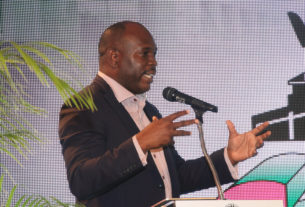BY JULIE CARRINGTON | OCT 7, 2022
Prime Minister Mia Amor Mottley. (FP)
Prime Minister Mia Amor Mottley, and her team met recently with officials from the World Bank to arrive at a solution to the Bank’s graduation policy that is based on the gross domestic product per capita and tends to exclude some countries like the Bahamas and Barbados from development financing.
During the talks at Ilaro Court, Ms. Mottley reminded the Bank’s Caribbean Director Lilia Burunciuc, that the institution’s policy of using a country’s income status to exclude countries from climate change financing was “fundamentally wrong”.
The Prime Minister contended that being graduated “carried other consequences for the island as a nation state” and suggested that both sides document their interpretation of graduation to “see where the bridges are” and seek to arrive at the best solution for both sides.
“The only way I know to bridge the gap when people are on different sides is to put all the facts on the table and let us see where we unite and where we differ and then out of that comes something that you can have a mature discussion to advance our cause,” Ms. Mottley stated.
She also pointed out that Barbados had been working hard and had passed all of the structural benchmarks under the International Monetary Fund’s programme and reiterated the need for the World Bank’s assistance to shore up the country against climatic events.
“We need the assistance of the Bank that was set up to do reconstruction and development…The reality is that there is a disparity between what is available…and all that we are asking for is the ability to survive in this world,” Ms. Mottley stressed.
She further stated: “We are not asking for it in an egregious way or an excessive way. But, we do believe that when institutions are not fit for the times in which they live, then others will suffer…”
Emphasising that “acute vulnerabilities” to climate-related events were ever present for Barbados and, by extension the region, Ms. Mottley stressed the need for a collaborative approach to accepting the realities of the region.
Meanwhile, Ms. Burunciuc said the World Bank was willing to find ways to address “not necessarily vulnerabilities but resilience because we want to take it from the positive side. So, we are going the way of finding solutions for addressing resilience and vulnerabilities”.
The Country Director also gave the undertaking that efforts would be made to accelerate the issues when they are raised at the board meetings.


